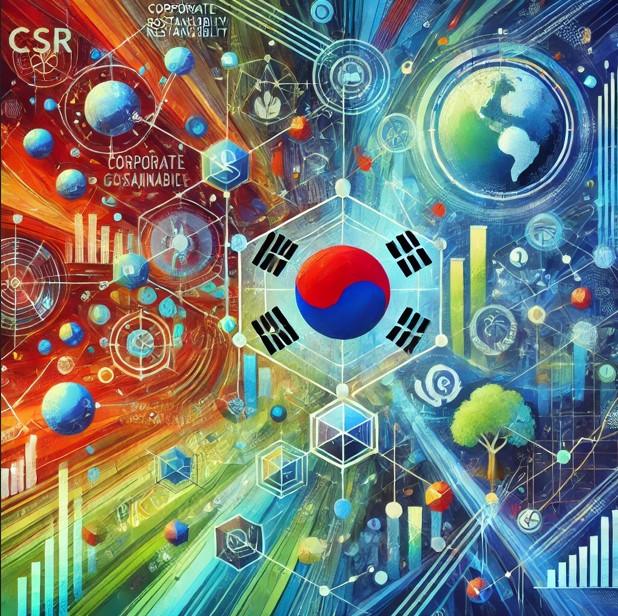Corporate Social Responsibility (CSR) in South Korea has evolved significantly over the years, with companies increasingly adopting socially responsible practices that align with global standards. South Korea’s approach to CSR is shaped by the nation’s rapid industrialisation and the influence of ‘chaebols’ (large family-owned business conglomerates like Samsung, Hyundai, and LG). Traditionally, South Korean companies engaged in philanthropic activities, but more recently, CSR has become more integrated into core business strategies, focusing on sustainability, ethical governance, and social impact.
Key Characteristics of CSR in South Korea:
Government Influence and Regulation: The South Korean government plays an active role in promoting CSR. It has introduced policies that encourage sustainable development, environmental conservation, and corporate transparency. Korean Commercial Law (2011) requires companies to disclose CSR-related activities in their business reports, increasing transparency and accountability.
Environmental Sustainability: South Korea is heavily focused on environmental sustainability, driven by its status as a global leader in technology and manufacturing. Companies are investing in green technologies, renewable energy, and climate action as part of their CSR commitments. Samsung Electronics and LG are leading the way with initiatives aimed at reducing carbon emissions, recycling e-waste, and adopting sustainable production methods.
Labour Rights and Workplace Welfare: South Korean companies have faced challenges in improving labour conditions, especially in sectors like manufacturing. However, there has been increasing pressure to ensure fair wages, worker safety, and gender equality in the workplace.
Companies like Hyundai and POSCO are focusing on enhancing employee well-being, training, and skill development as part of their CSR initiatives.
Education and Community Development: South Korean companies are known for investing in educational initiatives and community development. Large corporations often fund scholarships, build schools, and support underprivileged communities. Samsung runs various educational programmes under its Samsung Dream Class initiative, helping children from low-income families receive quality education.
Global CSR Efforts: As South Korean companies expand globally, they have adapted their CSR practices to meet the social and environmental expectations of the countries they operate in. Companies like LG, Hyundai, and Samsung are actively involved in CSR initiatives in the countries where they have a presence, including India.
South Korean Companies in India
South Korean companies have a significant presence in India, contributing to the country’s economic growth and development. These companies operate across various sectors, including technology, automobiles, consumer electronics, and heavy industries. South Korean firms are also involved in CSR initiatives in India, focusing on education, healthcare, environmental sustainability, and skill development.
Key South Korean Companies in India and Their CSR Efforts:
- Samsung Electronics: Samsung has a strong foothold in the Indian electronics market, with manufacturing plants in Noida and other regions. The company produces smartphones, TVs, home appliances, and more.
- CSR Initiatives: Samsung’s Smart Class initiative has installed smart classrooms in over 1,500 government schools across India, benefiting students by providing digital learning tools. Samsung also runs the Samsung Technical School programme, offering vocational training to youth to help them gain employable skills.
- Hyundai Motor India: Hyundai is one of India’s leading automobile manufacturers, with a production facility in Tamil Nadu. The company is known for producing popular car models like the Creta, i20, and Venue.
CSR Initiatives: Hyundai’s ‘Happy Move Global Youth Volunteers Programme’ focuses on community welfare and environmental sustainability. The programme includes activities like tree plantation drives, education support, and healthcare services. Hyundai India is also committed to road safety and has launched the Safe Move Campaign, which promotes traffic safety education for children.
- LG Electronics India: LG is a leading player in India’s consumer electronics market, producing home appliances like refrigerators, washing machines, and air conditioners.
- CSR Initiatives: LG’s ‘Karein Roshni’ (Bringing Light) initiative supports eye care for underprivileged communities, conducting free eye check-up camps and surgeries across India. LG Electronics is also involved in education-related CSR initiatives, providing scholarships and digital learning tools to students from underserved areas.
- POSCO India: POSCO, the South Korean steel giant, has operations in Maharashtra and Karnataka, producing steel for various industries in India.
CSR Initiatives: POSCO India’s CSR activities focus on education, healthcare, and infrastructure development in rural areas. The company runs vocational training centres for youth and supports healthcare facilities in nearby communities.
- Kia Motors India: Kia entered the Indian automobile market with its production plant in Andhra Pradesh, manufacturing popular car models like the Seltos and Sonet.
- CSR Initiatives: Kia has undertaken various community development programmes, focusing on environmental conservation, education, and healthcare. The company also engages in skill development programmes aimed at empowering local youth with employable skills.
Indian Companies in South Korea
While the presence of Indian companies in South Korea is relatively limited compared to South Korean firms in India, several Indian conglomerates have established operations in South Korea. These companies operate in sectors like IT, pharmaceuticals, manufacturing, and renewable energy. Indian firms in South Korea are also involved in CSR efforts focused on local community development and cultural exchange.
- Tata Group (Tata Motors and Tata Daewoo): Tata Motors entered the South Korean market by acquiring Daewoo Commercial Vehicles in 2004. Tata Daewoo produces heavy trucks and commercial vehicles for both the domestic market and exports.
CSR Initiatives: Tata Daewoo engages in CSR activities in South Korea, focusing on road safety, environmental sustainability, and community development.
- Mahindra & Mahindra (SsangYong Motors): Mahindra acquired a majority stake in South Korean SUV manufacturer SsangYong Motor in 2010. SsangYong is known for producing popular SUVs like the Tivoli and Rexton.
CSR Initiatives: Mahindra promotes sustainable mobility and environmental conservation in South Korea, aligning with its global focus on green technologies and electric vehicles. The company also supports employee welfare programmes and community engagement initiatives.
- Infosys: Infosys, India’s leading IT services company, operates in South Korea, offering IT consulting and software solutions to local clients in various industries.
CSR Initiatives: Infosys focuses on employee well-being and skill development in South Korea, as well as promoting education and technological innovation in collaboration with local universities.
- Sundaram Fasteners: Sundaram Fasteners, part of the TVS Group, has a manufacturing facility in South Korea producing high-tensile fasteners for the automotive industry.
CSR Initiatives: The company is involved in CSR activities that promote skill development and education for local communities in South Korea, as well as supporting environmental sustainability in its operations.
CSR in South Korea is characterised by strong government influence, environmental sustainability, and a focus on education and community welfare. South Korean companies in India, such as Samsung, Hyundai, and LG, are deeply engaged in CSR activities that align with local needs, particularly in education, healthcare, and environmental sustainability.
Similarly, Indian companies like Tata Motors, Mahindra, and Infosys have established a presence in South Korea, contributing to local communities through CSR initiatives focused on sustainability, skill development, and community engagement.
About the Author: Prof (Dr) Shalini Verma ‘Lifoholic’ is Founder - SAMVAW FOUNDATION | Impact Leadership Coach | Director - Aadya Green Gifting Pvt. Ltd. | Award-winning Author with 75 Published Books | ESG Consultant | Certified Independent Director
Author may be reached at: impactleadership@lifoholicshalini.com
Follow her on: https://www.linkedin.com/in/drshaliniverma/


